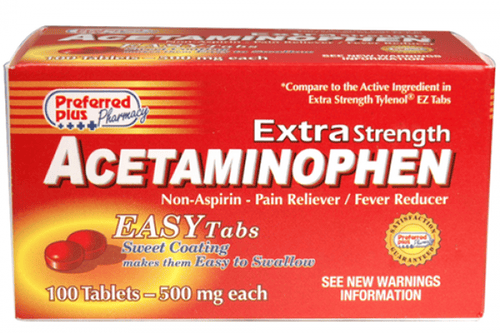This is an automatically translated article.
Acetaminophen rectal belongs to the group of antipyretic and pain relievers indicated in many conditions such as muscle pain, headache, back pain, arthritis, cold, toothache and fever... Let's learn about the notes When using Acetaminophen rectally through the article below.
1. Uses of rectal Acetaminophen
Acetaminophen suppository containing active ingredient Acetaminophen is indicated in conditions such as muscle pain, headache, back pain, arthritis, cold, toothache and fever..
2. Dosage and how to take Acetaminophen rectally
2.1. Dosage Dosage of Acetaminophen suppository is prescribed by the treating doctor. Accordingly, the dose should be determined by weight for patients weighing less than 50kg. The total dose of Acetaminophen from all routes of administration should not exceed the recommended daily dose (Not to exceed 4 g/day in adults weighing more than 50 kg, not more than 75 mg/kg/day in adults and adolescents weighing less than 50 kg). 50kg).
2.2. Overdose and Treatment Overdosage with the recommended dose of Acetaminophen leads to symptoms including nausea, loss of appetite, vomiting, stomach pain, sweating and confusion, blood in the urine or stools, difficulty urinating or painful urination, sudden decrease in urine output...
In case of overdose symptoms, the patient should be taken to a medical facility as soon as possible for timely treatment.
3. How to use Acetaminophen rectally?
Use the drug at the recommended dose or as prescribed by the doctor. Do not take acetaminophen rectally in larger doses or for longer than recommended.
Using Acetaminophen rectally in reducing fever in children needs the correct dose as prescribed by the doctor. Absolutely do not use the drug in children under 2 years old without a doctor's prescription.
How to use acetaminophen rectal tablets as follows:
Wash your hands before inserting the medicine; Remove the medicine cover before use, avoid manipulation for too long will cause the medicine to melt; The patient prepares for the position by lying on his back, kneeling slightly forward. Place the suppository gently into the rectum, the pointed end of the tablet inserted first. The patient needs to lie down for a few minutes after placing the tablet, the tablet will dissolve quickly, so that the patient will not feel uncomfortable.
4. Side effects of rectal Acetaminophen
Anal pain relievers Acetaminophen can cause some of the following side effects:
Severe allergic skin reactions, which can lead to death. This condition can occur even if the person has used Acetaminophen in the past but has no symptoms. Stop using the drug and notify your doctor immediately if a skin rash or rash spreads, causing peeling, blistering; Upper stomach pain, nausea, loss of appetite, dark urine, itching, clay-colored stools, jaundice, yellow eyes...
4. Note when using Acetaminophen rectally
Patients need to stop using Acetaminophen rectal in case of nausea, loss of appetite, upper stomach pain, dark urine, clay-colored stools, jaundice...
Acetaminophen has the potential to increase the effect. of alcohol and other CNS depressants such as antihistamines, allergy medications, tranquilizers, central analgesics, muscle relaxants, anesthetics... Besides, the risk of damage Liver damage is increased when patients consume alcoholic beverages while being treated with acetaminophen.
Acetaminophen can cause serious allergic reactions, including anaphylaxis. Therefore, patients need to inform their doctor about allergy drugs as well as the risk of allergies to foods and drinks...
There are currently no studies proving the safety and effectiveness of the drug. Acetaminophen rectally in children under two years of age. Therefore, this drug should only be used when prescribed by a doctor.
Elderly: Studies have shown no need for dose adjustment in the elderly.
Women who are breastfeeding: Only treat with Acetaminophen suppositories in lactating women when absolutely necessary.
5. Acetaminophen Anal Drug Interaction
5.1. Drug-Drug Interactions Some drugs can interact with Acetaminophen rectal, including over-the-counter and prescription drugs, vitamins, herbal products, etc. Some drugs can cause interactions. with Acetaminophen as follows:
Pixantrone, vaccine against bacteria 13 - Valent caused by diphtheria and pneumococcal combination, Imatinib, Isoniazid. Concomitant use of Acetaminophen with the following medicines may increase the risk of side effects: Acenocoumarol. Fosphenytoin, Carbamazepine, Lixisenatide, Phenytoin, Warfarin, Zidovudine. 5.2. Drug-Beverage, Food Interactions Do not use alcohol, beer, alcohol and smoking during treatment with acetaminophen, because they increase the risk of experiencing side effects of the drug.
The comorbidities greatly affect the effectiveness of Acetaminophen use, so the patient should notify the treating doctor when having the following comorbidities:
Abuse of alcohol or have a history of abuse alcohol use; Severe hypovolemia; Diseases of the kidneys, liver; Malnutrition . Acetaminophen suppositories belong to the group of antipyretics and pain relievers indicated in many conditions such as muscle pain, headache, back pain, arthritis, colds, toothache and fever... To ensure effective use and To avoid unwanted side effects, patients need to take the drug exactly as directed by a doctor or pharmacist.
Follow Vinmec International General Hospital website to get more health, nutrition and beauty information to protect the health of yourself and your loved ones in your family.
Please dial HOTLINE for more information or register for an appointment HERE. Download MyVinmec app to make appointments faster and to manage your bookings easily.
Reference source: drugs.com











